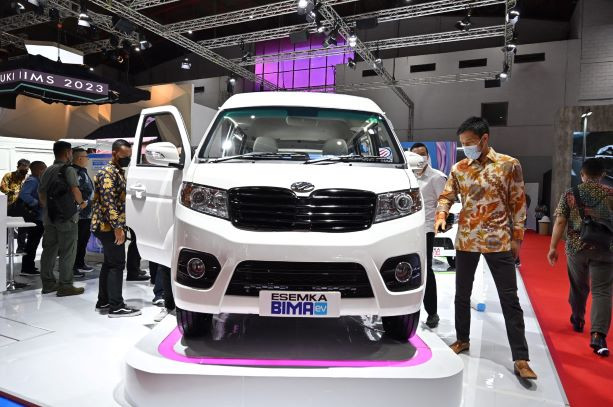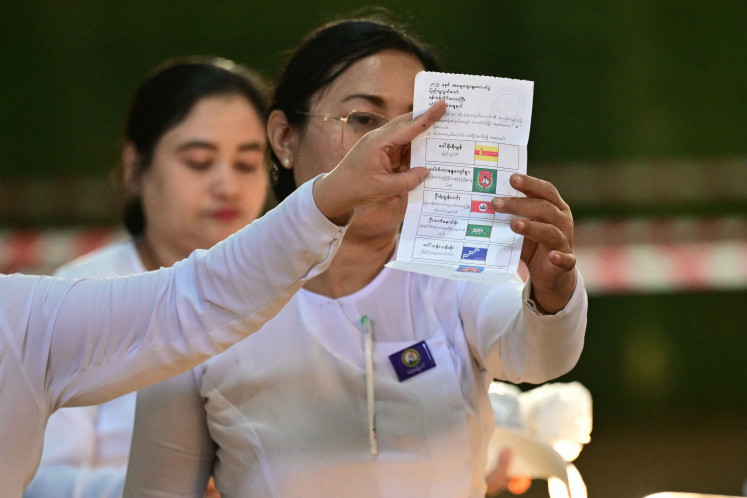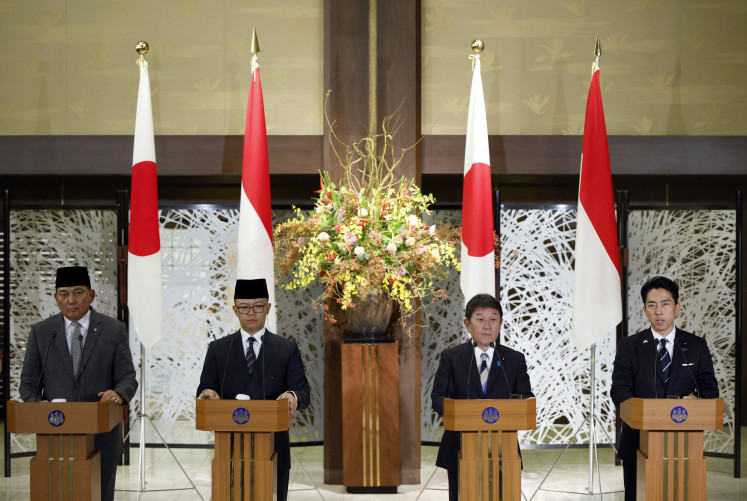Popular Reads
Top Results
Can't find what you're looking for?
View all search resultsPopular Reads
Top Results
Can't find what you're looking for?
View all search resultsEqual partners in key minerals
Critics have said that a large investment from China in Indonesia’s nickel industry may have become a major hurdle to partnership with the US.
Change text size
Gift Premium Articles
to Anyone
T
he rise of electric vehicles (EVs) has triggered a global race for critical minerals. The rush to secure critical minerals has created partnerships between minerals-producing and EV-producing countries.
As a major supplier of such key minerals, Indonesia has tried to align itself with large EV manufacturing countries, including the United States and China. During the recent visit by US Vice President Kamala Harris, President Joko “Jokowi” Widodo formally invited the US to work on an agreement on critical minerals, similar to those the US has secured with Japan and other partners.
A critical minerals agreement is a limited free trade deal that the US has designed to include its preferred countries in the incentives offered by the US Inflation Reduction Act, and to form a strong EV supply chain. It originally aimed to include Japan and the European Union, trading partners with which it does not yet have fully fledged free trade agreements.
However, there has been criticism that the agreements that the US has signed with its partners are not enough because they do not include major nickel producers like Indonesia, the Philippines and Russia. The problem is that the US is more interested in the low-hanging fruit, those countries that already have close trade relationships or geographical proximity to include in its EV supply chain.
US Trade Representative Katherine Tai said it is possible to bring ASEAN countries into the US production chain, but the first country that will benefit is subject to change. This does not look like a closed door for Indonesia, but not exactly a door left wide open.
Indonesia should, therefore, continue to look for beneficial partnerships and form its own group of mutual partners to develop its EV industry.
Critics have said that a large investment from China in Indonesia’s nickel industry may have become a major hurdle to partnership with the US. Chinese companies have invested heavily in refining facilities, including the country’s first high-pressure acid leach (HPAL) plant that produces first-grade nickel used for EVs. The plant, located on Obi Island, North Maluku, is a joint venture between Indonesia’s Harita Nickel and China’s Lygend Resources.
China’s huge investment in the nickel-processing industry may make it appear that China would benefit if the US signed a minerals trade deal with Indonesia.
But to say that Indonesia only favors China is an overstatement. As far as Jokowi and his aides are concerned, they are more than willing to forge a partnership with anyone who is interested. Indonesia, for instance, has developed mutually beneficial partnerships with South Korean companies like Hyundai and LG to develop local EV production that continues to thrive.
With Australia, Indonesia has formed an initial agreement to develop nickel and lithium, which has the potential to be a global partnership to produce EV batteries.
And the opportunities are definitely open for the US and other countries. However, as with any other good partnership, Indonesia should stand equal to anyone who wants to sign a business deal. For example, how can Indonesia be considered an equal and mutually beneficial partner if it is seen only as a part of ASEAN? If the US really intends to do business with Indonesia, it should acknowledge the world’s largest nickel producer as an equal partner in its own right.
The Indonesian government may have overplayed its hand by implementing various bans on its key minerals, perhaps a less-than-elegant way to bargain for itself in front of potential partners.
But if there are no major interested partners other than China, it may be more reasonable for Indonesia to play it cool. There is no point of trying so hard if the demand for its nickel is not as high as what the government expects.
What it should consider is the pace of development of its nickel industry compared with the growth of other parts of the EV ecosystem. If Indonesia is too eager to develop everything now, given the current high appetite for nickel, the reserves may be depleted soon, even before it can develop its own EV manufacturing and battery production.
It might not be a bad idea to keep everything in the ground, unexploited, until better suitors offer better deals to Indonesia











